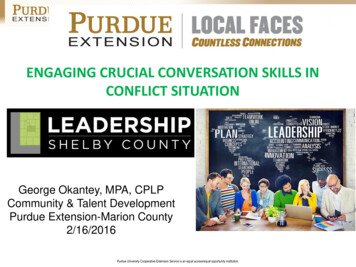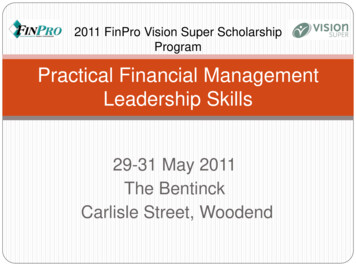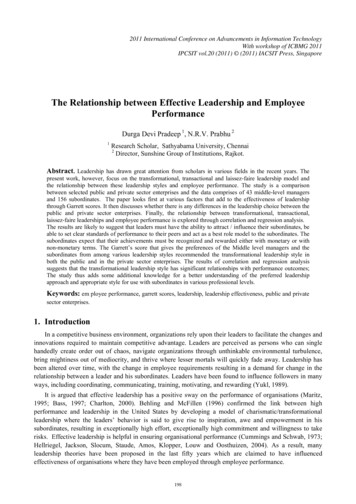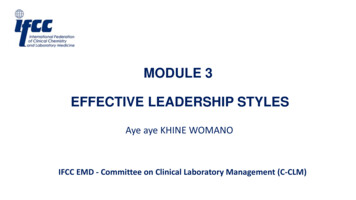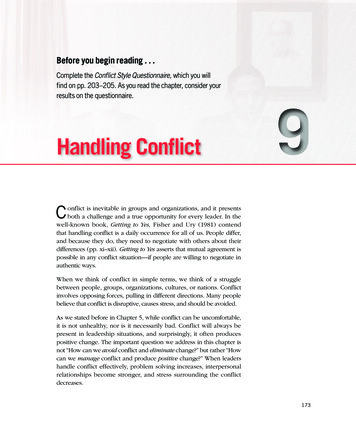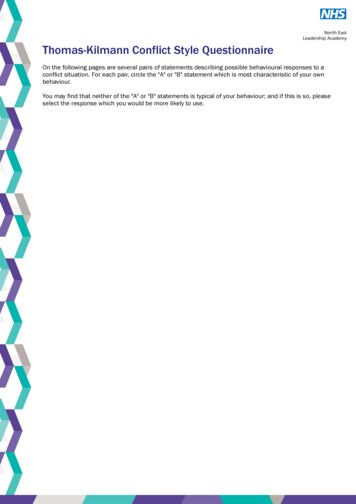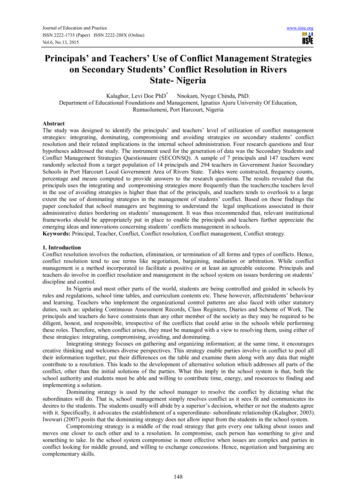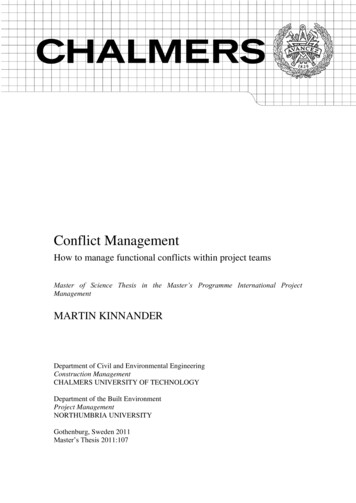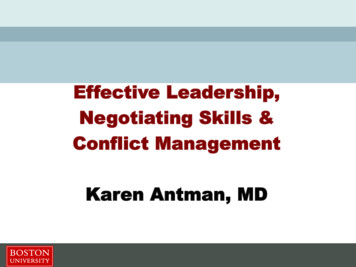
Transcription
Effective Leadership,Negotiating Skills &Conflict ManagementKaren Antman, MDBoston University Medical Campus
Who studies leadership? Management Schools Public Health schools Military Medical schools ResidenciesBoston University Medical Campus
Management Education Leadership– Your personal style– Using human resources effectively Strategy & operations Importance of diversity Financial– Marginal costs– Fully loaded budgets–Boston University Medical Campus
Things they don’t teach you inmedical or grad school Executive developmentOrganizational cultureChange managementNegotiating skills, managing conflictDealing with the pressHealth lawAccountingBoston University Medical Campus
Leadership in Academia Requires: Recognition in your area of excellence People skills– The vision thing– Conflict resolution– Politics relationships Fiscal understanding & responsibilityBoston University Medical Campus
The Five Disciplines of tipliersThe Empire Builder: Hoards resourcesand underuses talentThe Talent Magnet: Attracts talentedpeople and uses them at their highestpoint of contributionThe Tyrant: Creates a tense environment The Liberator: Creates an intensethat suppresses people's thinking andenvironment that requires people's bestcapabilitythinking and workThe Know-It-All: Gives directives thatdemonstrate how much they knowThe Challenger: Defines an opportunitythat causes people to stretch theirthinking and behaviorsThe Decision Maker: Makes centralized,abrupt decisions that confuse theorganizationThe Debate Maker: Drives soundsdecisions through rigorous debateThe Micromanager : Drives resultsthrough their personal involvementThe Investor: Gives other people theownership for results and invests intheir successBoston University Medical Campus
Why Negotiation Skills? Better manage your practice, lab,community group, or medical school. Improve the way you are treated Maintain relationships Mixing administration, teaching &care prevents burnout. Everything is a negotiationBoston University Medical Campus
Based on Standard TextsNegotiating Bargaining for Advantage Negotiation GeniusConflict: Harvard NegotiationProject Getting to Yes Difficult ConversationsBehavioral Economics Freakonomics Predictably IrrationalBoston University Medical Campus
Managing Conflict NegotiatingThe principles are the sameBoston University Medical Campus
Getting to YesFisher and UryProcess Separate the People and the IssuesWhat is right vs. Who is right Focus on Interests Generate Options Use Objective CriteriaSuggests strategies for when theother party: Is more powerful Uses dirty tricksBoston University Medical Campus
Stages of Negotiation PreparingProbingProposingClosingBoston University Medical Campus
Stages of Negotiation – PreparingKnow:1. Your bargaining styles2. Your goals: Frame high realistic3. Standards of fairness4. Your Best Alternative to a NegotiatedAgreement (BATNA)5. Needs, wants, styles of other person/team6. Value of relationshipsBoston University Medical Campus
Break for self assessmentThomas-KilmannConflict Mode InstrumentBoston University Medical Campus
Boston University Medical Campus
Bargaining StylesEmploy the right style for the situation1.2.3.4.5.Avoider: hates/avoids conflictCompromiser: relationship is primaryAccommodator: solves others problemsCompetitor: I win, you loseCollaborator: Problem solver, bigger pie,win/winBoston University Medical Campus
Employ the right style for the situationAvoider:pick your battles: your teenager, spouseCompromiser:small difference; not worth the time.Accommodator:who gets on the airplane first?Who cares?Competitor:sports; or important, but no relationshipCollaborator:decision matters; important relationshipBoston University Medical Campus
Emergency Conditions In an emergency, if you know what youare doing, be Directive Deer in the headlights problem Need to get people to act– CPR: Call 911!– Leave the buildingBoston University Medical Campus
Nego&a&ngStylesCooperators 60% are cooperative 75% of effective negotiators are cooperative. Avoid attack and defend spirals, emotion-ladenassigning of blame.Competitors 24% are truly competitive. Only 12% of effective negotiators are competitive.Boston University Medical Campus
mselves(projec&on). gerous. thusdifficulttoconvert.Boston University Medical Campus
Use appropriate strategy for situationDetermine if situationis collaborative orcompetitive; actaccordingly:– How much to sayor conceal– When to say itBoston University Medical Campus
PrepareYourGoals Think carefully about what you really want. Goals: set upper limit of what you will ask for. Youmentally concede everything beyond your goal, soyou seldom do achieve higher. You can’t hit a target if you never ask for it. Commitment to challenging but achievable goalsprovides significant psychological edge. Thus focus on your highest legitimate expectation ofwhat you should achieve, not the bottom line.Boston University Medical Campus
Determine your Best Alternative to aNegotiated Agreement (BATNA) Don’t accept less than your BATNA:Fisher & Ury of the Harvard NegotiationProject Game theory concept of a disagreement point: Nobel Laureate JohnForbes Nash (A Beautiful Mind)Boston University Medical Campus
Standards,AuthorityandConsistency Socializedtorespect,deferto,andobeyauthority Wewanttobeseenasreasonableandconsistent. y.Boston University Medical Campus
StandardsandConsistency An&cipatetheirpreferredstandards Frameyourproposalwithinthosestandards. dyadopted. Encouragethemtobeconsistent.Boston University Medical Campus
ConsistencyTrap The tip-off: You are asked to agree withsome statement before telling you whythe statement is important. Used by aggressive negotiators,lawyers and telemarketers.Boston University Medical Campus
Stages of Negotiation - Probing Gather points of view ListenPosition Focus on interests Strategize win-winoptions Evaluate options Propose agreementsBoston University Medical CampusInterests
Stages of Negotiation - Probing Negotiate face to face Establish rapport (liking rule): we like andtrust “people like us”, and are more likely tosay yes. Match style: confront bullies early Train people to be cooperative.InterestsBoston University Medical Campus
Stages of Negotiation - Probing Get all bad news out early Ask questions: probe first, discloselater Make sure you understand Signal expectations and leverage SummarizeInterestsBoston University Medical Campus
Stages of Negotiation - Proposing Concrete proposal; offer a solution Anchor effect of first proposal– Uninformed: never open– Well informed: open first Must be somewhat reasonable:Outlandish offers kill the deal or yourcredibility if you drastically change theoffer later.Boston University Medical Campus
TheBargainingZone 100 150 0 250Seller’s bottom line:Seller must get atleast 100.Buyer’s bottom line:Most buyer will payis 150.During negotiations, people tend to gravitate toward theirbottom line rather than measure against their bargaining goal.Boston University Medical Campus
Success rate? Excuse me, I have 5 pages. May I use the Xeroxmachine? Excuse me, I have 5 pages. May I use the Xeroxmachine because I am in a rush? Excuse me, I have 5 pages. May I use the Xeroxmachine because I have to make copies? Excuse me, I have 20 pages. May I use the Xeroxmachine? Excuse me, I have 20 pages. May I use the Xeroxmachine because I am in a rush?Boston University Medical Campus
The Power of “Because” Excuse me, I have 5 pages. May I use the Xeroxmachine? Success rate 60% Excuse me, I have 5 pages. May I use the Xeroxmachine because I am in a rush? Success rate 94% Excuse me, I have 5 pages. May I use the Xeroxmachine because I have to make copies? Successrate 93% Excuse me, I have 20 pages. May I use the Xeroxmachine? Success rate 24% Excuse me, I have 20 pages. May I use the Xeroxmachine because I am in a rush? Success rate 42%Boston University Medical Campus
Stages of Negotiation - Closing Secure an agreement: start smallTest reciprocity in non-important areaConfirm agreementMake the other side feel like it got a good deal.Lots of negotiating tactics with names:– Scarcity tactic: someone else wants it.– Deadlines: e.g deal is good for 5 days Do not sucumb to leverage loss aversion: give uptoo much at the end. Commitment not just agreement: Public stake in theGround, penalty both ways if agreement not kept.Boston University Medical Campus
Getting to YesFisher and UryA good agreement is wise and efficient, improves the parties'relationship. satisfy the parties' interests fair and lasting.Boston University Medical Campus
Win at Workplace Conflict: Jeffrey PfefferStay focused on the most essentialobjectives.Don’t fight over things that don’t matter.Build an empathetic understanding ofothers’ points of view.Keep your friends close & your enemiescloser.Use humor to defuse difficult situations.Boston University Medical Campus
Read and Practice Practice at work (and at home) Exercises—your turn.– Sour grapes– Get a raise?– Disputed authorshipBoston University Medical Campus
Good Weekend ReadingNegotiatingChange: Bargaining for Advantage Execution: discipline ofgetting things done Negotiation Genius Good to Great: SocialSectorsConflict: HarvardUnderstandingpersonalitiesNegotiation Project Getting to Yes Multipliers Difficult Conversations Type in Organizations Please Understand MeBoston University Medical Campus
Stages of Negotiation - Probing Negotiate face to face Establish rapport (liking rule): we like and trust “people like us”, and are more likely to say yes. Match style: confront

